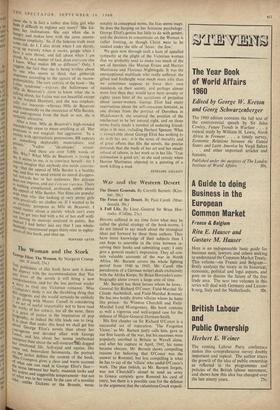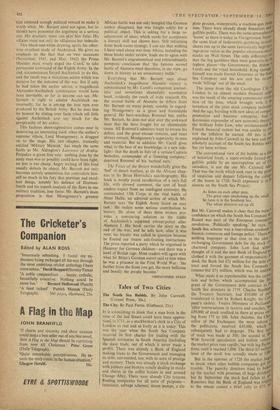War and the Western Desert
A Full Life. By Lieut.-General Sir Brian Hor- rocks. (Collins, 25s.)
HAVING suffered in my time from what may be called the global strategy of the book-rooms, I do not intend to say much about the strategical ideas put forward by these three authors. They have more knowledge of their subjects than I can hope to assemble in the time between re- ceiving their books and submitting copy; I only give a general reader's impression. They all con- tain valuable accounts of the war in North Africa. Mr. Barnett covers the whole fighting period from 1940 to 1943; Mr. Carell (the pseudonym of a German writer) deals exclusively with the Afrika Korps; Sir Brian Horrocks's auto- biography alone covers a large area of time.
Mr. Barnett has three heroes whom he loves: General Sir Richard O'Conor, Field-Marshal Sir Claude Auchinleck, and Field-Marshal Rommel. He has two boldly drawn villains whom he hates like poison: Sir Winston Churchill and Field- Marshal Lord Montgomery. His book contains as well a vigorous and well-argued case for the defence of Major-General Dorman-Smith.
His first chapter on Sir Richard O'Conor is a successful act of reparation. 'The Forgotten Victor,' as Mr. Barnett justly calls him, gave us our first laurels of the war, but his successes were popularly ascribed in Britain to Wavell alone, and after his capture in April, 1941, his name became obscure. Mr. Barnett shows compelling reasons for believing that O'Conor was the answer to Rommel, but less compelling is what he has to say of the 'villain' who undid O'Conor's work. The plan (which, as Mr. Barnett forgets, was not Churchill's alone) to send an army to Greece certainly gave Rommel his card of entry, but there is a possible case for the defence in the argument that the calamitous Greek. expcdi-
tion returned enough political reward to make it worth while. Mr. Barnett need not agree, but he should have presented the argument as a serious one. His dramatic sense can play him false. His villains must not only be villainous but imbecile.
This black-and-white drawing spoils his other- wise excellent study of Auchinleck. He gives no emphasis to the fact that on two occasions (November, 1941, and May, 1942) the Prime Minister most wisely urged the C-in-C to take
• permanent command of the Eighth Army. In the end, circumstances forced Auchinleck to do this, and the result was a victorious action which was decisive for the outcome of the war. But if only he -had taken the earlier advice, a magnificent Alexander-Auchinleck combination would have been inevitable, so far as anyone can see. Mr. Barnett is right to admire Auchinleck un- reservedly, for he is among the best men ever produced by the British Army. But he does him no honour by sliding over facts which tell little against Auchinleck and say much for the perspicacity of his critics.
This factious short-sightedness comes near to destroying an interesting book when the author's supreme villain, Lord Montgomery, is dragged on to the stage. His last chapter, ironically entitled 'Military Messiah.' has much the same faults as Mr. Aldington's Lawrence of Arabia. Prejudice is given free rein : nothing done by the nasty man was or possibly could have been right; no jeer is too cheap. Angry writing of this kind usually defeats its object. Mr. Barnett not only becomes naïvely sententious but contradicts him- self so much in his fury that previous and excel- lent things, notably his defence of Dorman- Smith and his superb analysis of the flaws in our military tradition, lose force. Mr. Barnett's main proposition is that Montgomery's greatest
African battle was not only bungled (the German author disagrees), but was fought solely for a political object. This is asking for a large re-
adjustment of ideas, which needs for acceptance a literary skill not shown here. Still refraining from book-room strategy, I can say that nothing I have read about war-time Africa, including the three books under review, leads me to agree with Mr. Barnett's ungrammatical and extraordinarily pompous conclusion that 'the famous second battle of Alamein must therefore, in my view, go down in history as an unnecessary battle.'
Everything that Mr. Barnett says about Auchinleck's magnificent Alamein victory is substantiated by Mr. Carell's competent, journal- istic and sometimes shamefully novelettish book, evidently the result of wide research. On the second battle of Alamein he differs from Mr. Barnett on many points, notably in regard- ing Montgomery as a great and .formidable general. He hero-worships Rommel but, unlike Mr. Barnett, he does not skid over the awkward issue that the hero fought for an abominable cause. All Rommel'i admirers want to excuse his defeat, and the great excuse remains, and must always remain, Montgomery's superiority in men and material. But in addition Mr. Card ll gives what', to the best of my knowledge, is a new side- light: that the death in July of a certain Captain Seebohm, commander of a 'listening company,' deprived Rommel of his 'tactical ears.'
The Foxes of the Desert wonderfully gives the 'feel' of desert warfare, as do the African chap- ters in Sir Brian Horrocks's autobiography. His book is mostly jovial recollection of a very full life, with shrewd comment, the sort of book readers expect from an intelligent extrovert. He commanded 13th Corps at the vital battle of Alam Haifa, an admired action of which Mr. Barnett says 'the Eighth Army faced an easy task.' He makes some serious contribution to history. He alone of these three writers pro- vides a convincing solution to the riddle of Auchinleck's supposed retreat-policy after Alamein I. His book carries the story to the end of the war, and he tells how, after it was over, his loyalty was called in question because he flouted our insane anti-fratting instructions. The press reported a party which he organised in Hanover for German children—and there was a howl of British rage. Most readers will agree with what Sir Brian's German escort said to him when he was a prisoner in the First World War : 'the farther from the front you get, the more bellicose and beastly the people become.'
CHRISTOPHER SPICES



































 Previous page
Previous page